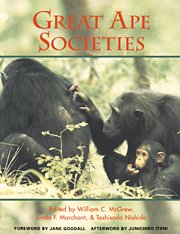Book contents
- Frontmatter
- Contents
- List of contributors
- Preface
- Foreword: conserving great apes
- Part I Apes overviewed
- Part II Social ecology
- Part III Social relations
- Part IV Minds
- Part V Apes compared
- 16 Comparative positional behavior of the African apes
- 17 Nest building behavior in the great apes: the great leap forward?
- 18 Comparative studies of African ape vocal behavior
- 19 On which side of the apes? Ethological study of laterality of hand use
- Part VI Modeling ourselves
- Afterword: a new milestone in great ape research
- Appendix: great ape study sites
- Index
18 - Comparative studies of African ape vocal behavior
Published online by Cambridge University Press: 04 August 2010
- Frontmatter
- Contents
- List of contributors
- Preface
- Foreword: conserving great apes
- Part I Apes overviewed
- Part II Social ecology
- Part III Social relations
- Part IV Minds
- Part V Apes compared
- 16 Comparative positional behavior of the African apes
- 17 Nest building behavior in the great apes: the great leap forward?
- 18 Comparative studies of African ape vocal behavior
- 19 On which side of the apes? Ethological study of laterality of hand use
- Part VI Modeling ourselves
- Afterword: a new milestone in great ape research
- Appendix: great ape study sites
- Index
Summary
INTRODUCTION
The close phylogenetic relationship between the African apes and humans has been known to Western science for well over a century. In comparing the differences between the African apes and humans, Thomas Henry Huxley (1863, p. 123) commented:
It would be no less wrong than absurd to deny the existence of this chasm, but it is at least equally wrong and absurd to exaggerate its magnitude, and, resting on the admitted fact of its existence, refuse to inquire whether it is wide or narrow.
Since the last Wenner-Gren conference on the great apes, the chasm to which Huxley referred has narrowed considerably. Ongoing research in captivity and in the field has progressively reduced a previously long list of traits that could be employed to differentiate the African apes from humans, and with this research, it has become increasingly clear that humankind's uniqueness may depend on a single characteristic, namely our ability to use speech and language.
While the proposition that speech is special is arguably true, it is important to note that this claim is based on very few data regarding the vocal behavior of our closest living relatives in the wild. Pioneering field work by Schaller (1963), Goodall (1968a), Marler (1969, 1976), Fossey (1972), Marler & Hobbett (1975) and Marler & Tenaza (1977) gave us an early, but admittedly rudimentary glimpse into the vocal repertoires of the African apes.
- Type
- Chapter
- Information
- Great Ape Societies , pp. 241 - 254Publisher: Cambridge University PressPrint publication year: 1996
- 19
- Cited by



